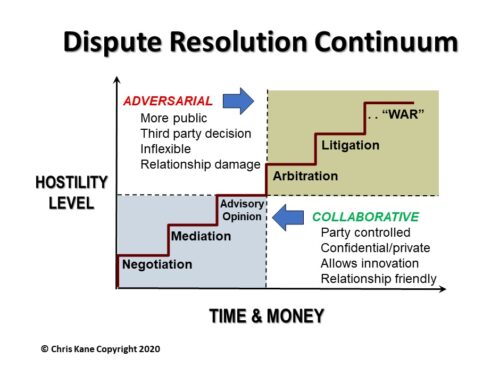 Mediation ranks high among the alternative dispute resolution mechanisms used for conflicts on infrastructure mega-projects. I wrote earlier about the important activities during pre-mediation phase: Lessons Learned in Mediation – Preparation in the Age of Zoom.
Mediation ranks high among the alternative dispute resolution mechanisms used for conflicts on infrastructure mega-projects. I wrote earlier about the important activities during pre-mediation phase: Lessons Learned in Mediation – Preparation in the Age of Zoom.
Developing and implementing best practices at the mediation session will increase the likelihood of getting to a resolution. Here are a few of the lessons learned in my 25 years of experience as a mediator that can make the mediation itself more production. As obvious as these seem, my experience has been unless the mediator focuses on these practices at the outset, these lessons may be overlooked.
1. AVOID “OPINIONS” AT THE START OF THE MEDIATION. The mediator in his or her opening statement, should be reluctant to give any opinions on anything at the start of the mediation. Any statements even about merits of positions, questions or assumptions about good intentions of the parties, can be offsetting to one or both of the parties or counsel. This is especially true when mediation is a requirement of the contract and not voluntarily elected by the disputants. Make sure you carefully script opening points and remarks.
2. AVOID PROBING QUESTIONS DURING THE JOINT SESSION. It is not a good idea to ask any probing questions at the joint session, again only factual clarifications. When you ask a pointed question concerning liability, even for clarification, it could easily be construed as an opinion on the part of the mediator. If it is viewed as favorable by one side, it may increase expectations. If it is viewed unfavorably by one side, it could hurt the perception of the mediator’s neutrality. Active listening and clarifying questions are the key mediator’s action during the parties’ opening statement.
3. GO SLOW – TO GO FAST. Often when the parties and counsel come into mediation, they are anxious to start trading proposals. Often these days in construction mediations, they may even want to skip the parties opening statements. While this may sometimes be appropriate in certain circumstances, I will always try to encourage the parties not to skip openings. One of the obstacles to settlement is when the parties feel like they haven’t been heard. Another problem is when the mediator doesn’t take the time to let the parties get a better understanding of their own weaknesses, and the other sides strengths regardless of the degree. Both of these problems take time to overcome.
4. FOCUS ON BATNA FIRST IN CAUCUSES. Turn attention early to the best alternative to a negotiated settlement & and evaluating the cost of litigation. Get both sides to do an estimate of their BATNA, including the cost to get there. Go back to this as you move proposals back and forth during pater stages of the mediation go along. Make sure to bring up cost of money and disruption to business as offsets to their BATNA. The mediator needs to have done his own evaluation of BATNA’s so he can probe the parties on whether they have considered everything.
5. BE CAREFUL WITH YOUR USE OF TERMS WHEN IN CAUCUS. Don’t ever say “we” when presenting a proposal to the other side since you will come across as having picked sides. If anything, say “they” when talking to the party in caucus, about the other side. It is easy to slip when you have just spent a significant amount of time with one side developing a proposal that seems like good movement to you. Focus carefully on what you are saying. When you present a position, strength or weakness by from one side, tell the other side that this is what their position is. You can always provide subtle opinions on how you feel, but be careful not to be evaluative yourself until you are closer to trying to get to closure.
6. BE READY TO BE ASKED YOUR OPINION AS WHAT THE CASE IS WORTH. Rarely have I had a mediation where a party has not asked my opinion. Try not to indicate where you think the matter should settle for, except as a last resort. Your opinion has a possibility of either raising expectations or diminishing hope for a settlement. If you say anything, indicate your ideas on what would be a reasonable movement for the next proposal, in the right direction. Of course, towards the end of the mediation you may want to offer numbers to each side, in the context of “if I could get them to agree to $X, would you consider that?” You don’t necessarily need to give all sides the same numbers either.
As a mediator, it is important to be aware of everything you say or do in order to allow the parties: to feel like they are in control; to perceive you as impartial and neutral; and to allow the process the time it needs to work. It is critical that you set a pace that builds momentum towards a settlement gradually, insures the parties feel invested in the process and doesn’t try to get finish in a hurry.
By: Chris Kane, P.E., J.D., Adjunct Professor of Mediation, William & Mary Law School.



